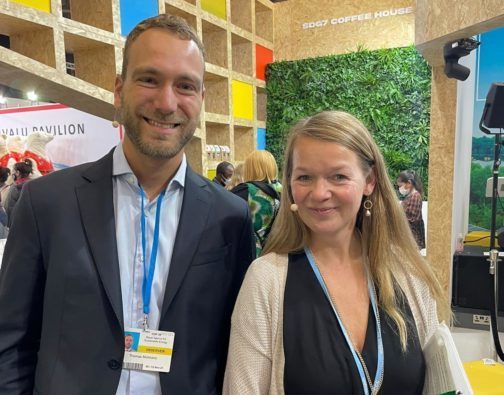On November 9 2021 at COP26, Climate Policy Initiative participated in an event organized by UK BEIS on accelerating the commercialization of innovative approaches in developing countries, to support clean energy transitions and energy access. Dr. Barbara Buchner, Global Managing Director at Climate Policy Initiative (CPI), moderated the event which had the participation of various actors in the field. Thomas Motmans from Basel Agency for Sustainable Energy, Oluwadabira Abiola-Awe from Student Energy, Claudia Sanchez from ACAIRE, and Sidney Muturi Wakaba from Camco Clean Energy were invited as panelists to speak of the factors needed to move innovative clean energy projects to commercialization.
Dr. Buchner began the event by highlighting the urgent need to develop innovative technologies, business models, and financial approaches for low-carbon sustainable development, as well as to move these models to scale quickly and effectively. She introduced the panelists, which made up a strong group of climate finance innovators, with much experience in addressing knowledge and capacity gaps that prevent the private sector from pursuing investment opportunities, and thus moving projects from concept to commercialization.

Lab proponent Thomas Motmans (BASE) joined CPI’s Global Managing Director Barbara Buchner at COP 26
Thomas Motmans from the Basel Agency for Sustainable Energy spoke of the experience from Cooling as a Service, or CaaS, a pay-per-use model for air-conditioning and refrigeration systems. CaaS was developed with support from the Global Innovation Lab for Climate Finance (the Lab) in 2019. Motmans mentioned key lessons learned with CaaS in moving to commercialization, including the need for the idea to be market-driven, and to make business sense for all stakeholders; be aligned with businesses, planet, and people; to meet real, existing, needs; and the need to tap into commercial financing and not just impact investing.
Claudia Sanchez of ACAIRE noted the need for familiarity with local conditions, particularly so that innovative projects are accepted by local stakeholders. Local priorities must be taken into account. She also mentioned the importance of capacity building, and training to improve the human talent required for these technologies. Sanchez also highlighted the fact that certification and third-party validation is a missing link in emerging markets, which must be addressed.
Oluwadabira Abiola-Awe, Ventures & Capital Campaign Associate at Student Energy, underlined the importance of understanding what the priorities look like for each region, as this will vary. She mentioned the need to also know what innovation looks like in different contexts. Local communities have projects that are most appropriate to the context, and having a space where they can share these projects to get funding for scaling is key.
Sidney Muturi Wakaba brought his experience with supporting and scaling small-scale renewable energy projects across sub-Saharan Africa. He spoke of the role that innovation in financing can play, particularly in developing a track record and history of success for new approaches and technologies. This can then generate the necessary data to scale them, but more entities are needed that are willing to take an early-stage risk to support renewable energy technologies grow and scale up. https://www.linkedin.com/video/live/urn:li:ugcPost:6863826275950313472/
Dr. Buchner closed the event by asking panelists their final thoughts on overcoming barriers related to knowledge, risk, and viability, and to accelerating commercialization of innovative technologies and business models. Panelists mentioned that a change in mindset and narrative is essential, to move from seeing risks and maximizing sales, to seeing opportunities to invest in the future and provide long-term value to customers. They also noted the need to focus on real, local needs in emerging markets. Lastly, panelists highlighted the extremely important role of catalytic capital, which remains largely missing in this space, but that can support innovative approaches take the first step towards commercialization.
Full recording below (starts at 01:05:30)


